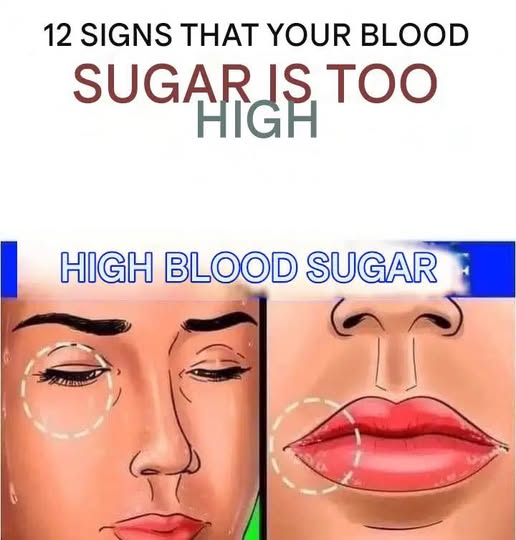
Maintaining balanced blood sugar levels is essential for overall health. When glucose levels rise excessively—a condition known as hyperglycemia—it can lead to various health issues. Recognizing the early signs is crucial for timely intervention. Here are 12 indicators that your blood sugar might be elevated:
1. Persistent Thirst (Polydipsia)
Experiencing constant thirst, even after drinking ample fluids, may indicate high blood sugar. Elevated glucose levels draw water from your cells, leading to dehydration and triggering an unquenchable thirst.
2. Frequent Urination (Polyuria)
High blood sugar prompts the kidneys to work overtime to filter excess glucose, resulting in increased urination, especially during the night.
3. Excessive Hunger (Polyphagia)
If you find yourself constantly hungry, even after meals, it could be due to your body’s inability to utilize glucose properly, signaling the need for more energy intake.
4. Fatigue and Weakness
Elevated blood sugar can prevent glucose from entering cells, depriving your body of energy and leading to persistent tiredness and weakness.
5. Blurred Vision
High glucose levels can cause swelling in the eye lenses, leading to blurred or distorted vision. This symptom often resolves once blood sugar levels are controlled.
6. Slow-Healing Wounds
Excess glucose can damage blood vessels, impairing circulation and slowing the body’s natural healing process, which increases the risk of infections.
7. Frequent Infections
High blood sugar can weaken the immune system, making the body more susceptible to infections, such as urinary tract infections, gum disease, and skin infections.
8. Numbness and Tingling in Hands or Feet
Elevated glucose levels can damage nerves, leading to sensations of numbness, tingling, or burning in the extremities—a condition known as diabetic neuropathy.
9. Mood Swings and Irritability
Fluctuating blood sugar levels can affect brain function, resulting in mood swings, irritability, and difficulty concentrating.
10. Dry Mouth and Skin
High blood sugar can lead to dehydration, causing dry mouth, cracked lips, and itchy skin. Staying hydrated and maintaining blood sugar levels can alleviate these symptoms.
11. Fruity or Acetone-Like Breath
A sweet or fruity odor on the breath may indicate diabetic ketoacidosis (DKA), a serious condition resulting from the body burning fat for energy due to insufficient insulin. Immediate medical attention is necessary if this symptom occurs.
12. Swollen Feet and Legs
Poor circulation caused by high blood sugar can lead to fluid retention, resulting in swelling of the feet, ankles, and legs. Monitoring blood sugar levels and staying active can help manage this symptom.
When to Seek Medical Attention
If you experience any of these symptoms, it’s important to consult a healthcare provider. Persistent high blood sugar can lead to serious complications, including nerve damage, kidney disease, and cardiovascular issues. Early detection and management are key to preventing long-term health problems.
Managing Blood Sugar Levels
Maintaining a balanced diet, engaging in regular physical activity, monitoring blood glucose levels, and adhering to prescribed medications are essential strategies for managing blood sugar. Regular check-ups with healthcare professionals can help tailor a plan that’s right for you.





